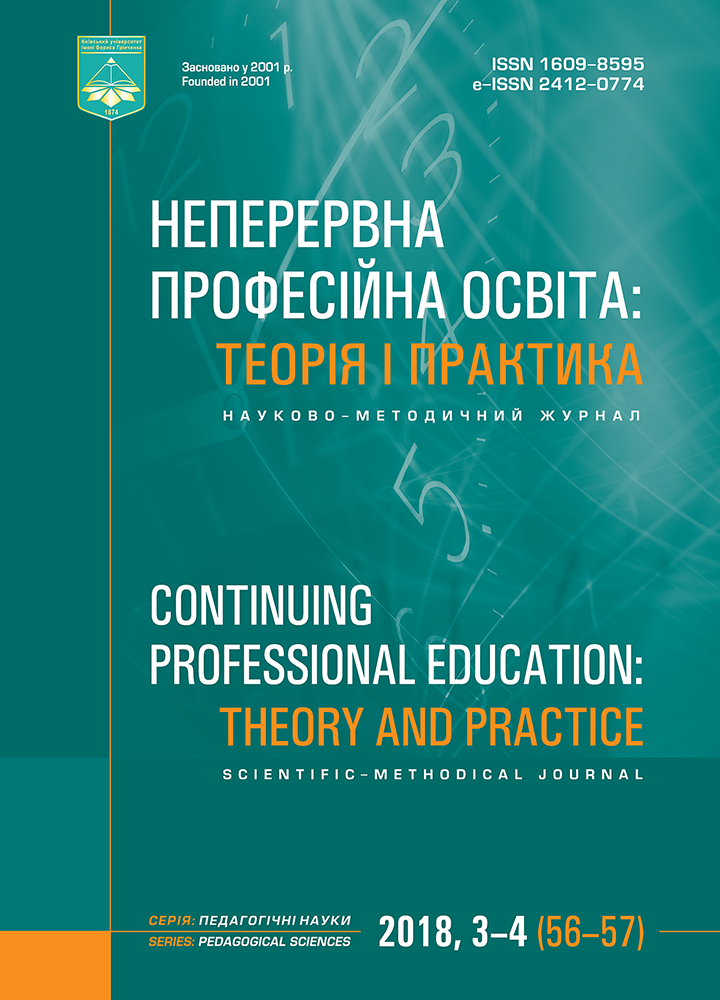MODELS OF PROFESSIONAL DEVELOPMENT OF TEACHERS IN THE CONDITIONS OF THE REFORM OF THE POSTAL PEDAGOGICAL EDUCATION
DOI:
https://doi.org/10.28925/1609-8595.2018.3-4.2127Keywords:
certification training, postgraduate education, professional development model, reform of postgraduate education.Abstract
The article presents an analysis of models of professional development of teachers in postgraduate education. Different approaches to the improvement of the skills of teachers are highlighted and models of professional development of teachers in the conditions of reform of postgraduate pedagogical education are offered. The research methods are presented, among them analysis, systematization and comparison of scientific positions to determine the theoretical approaches to solving the problem of professional development of teachers, modeling for creation of various trajectories of professional development of teachers; empirical: observation, conversation,interviewing. The criteria for constructing models of professional development of the teacher are defined and each of them is characterized by indicators and examples of introduction in postgraduate education. The basic approaches to realization of models of professional development are determined: competent, prolonged, differentiated, personally oriented, rational, mentoring and coaching and others.Models of professional development are diverse in terms of terms, forms of training (distance, full-time, blended learning), content, forms of teacher support, institution choice, choice of forms of training (webinar, pieces of training, seminars). Teachers work at different levels of professional development (professionalization, skills, creativity, innovation). Upgrading skills should consider the level of professional development of the teacher, encourage the involvement of innovative teachers as experts and tutors. Most models are integrated with each other. For example, a prolonged, competent model. In Ukraine, diversified, prolonged, personal-oriented and inter-sectoral models of the professional development of teachers.References
Derkach, A. A. (2003). Akmeologiya: uchebnoe posobie [Acmeology: textbook]. Saint Petersburg,Russia: Piter (rus).
Entsyklopediia osvity [Encyclopedia of Education] (2008). Kremen, V. H. (Ed.).Kyiv,Ukraine: Yurinkom Inter (ukr).
Nikolayesku, I. O. (2012). Praktichni osnovi akmeologichnogo rozvitku osobistosti v umovah osvitno-informacijnogo prostoru: navchalno-metodichnij posibnik [Practical bases of acmeological development of personality in educational and informational space: educational and methodical manual]. Cherkasi, Ukraine: OIPOPP (ukr).
Puhovska, L. P. (2011). Teoretichni zasadi profesijnogo rozvitku vchiteliv: ruh do konceptualnoyi karti [Theoretical foundations of professional development of teachers: movement to the conceptual map]. Porivnyalna profesijna pedagogika, 1, 97–106 (ukr).
Sinenko, S. I. (2002). Rozvitok pislyadiplomnoyi pedagogichnoyi osviti v krayinah zahidnoyi Yevropi (Angliya, Franciya, Nimechchina) [Development of Postgraduate Pedagogical Education in Western Europe (England, France, Germany)]. Pedahohіka i psykholohіia, 3, 12–15 (ukr).
Sorochan, T. M. (2010). Stvoriti osvitnij prostir profesijnogo rozvitku [Create an educational space for professional development]. Upravlinnya osvitoyu, 17, 13–15 (ukr).
Shinenko, M. A., & Soroko, N. V. (2012). Vikoristannya hmarnih tehnologij dlya profesijnogo rozvitku vchiteliv (zarubizhnij dosvid) [Use of cloud technologies for professional development of teachers (foreign experience)]. Information technology in education, 2 (12), 206–214 (ukr).
Day, R. R. (1991). Models and the Knowledge Base of Second Language Teacher Education. Retrieved from https://files.eric.ed.gov/fulltext/ED370359.pdf (eng).
Gallant, G. M. (2000). Professional development for web based teaching: overcoming innocence and resistance. New directions for adult and continuing education, 88, 69–78 (eng). DOI: 10.1002/ace.8807 (eng).
Super, D. E. (1953). A theory of vocational development. American psychologist, 8 (5), 185–190. DOI: http://dx.doi.org/10.1037/h0056046 (eng).
Shameem, Т. The Models of Teacher Education. Retrieved from http://tanvirdhaka.blogspot.ca/2011/01/models-of-teacher-education.html (eng).
Wallace, M. J. (1991). Training foreign language teachers: A reflective approach. Cambridge, Great Britain: University Press (eng).
Downloads
How to Cite
Issue
Section
License
Copyright (c) 2020 Iryna Vorotnykova

This work is licensed under a Creative Commons Attribution-NonCommercial 3.0 Unported License.



